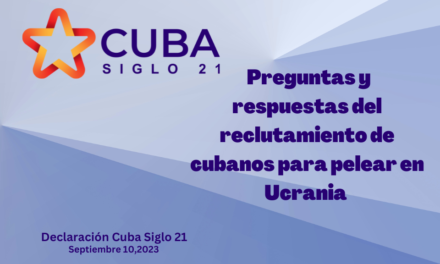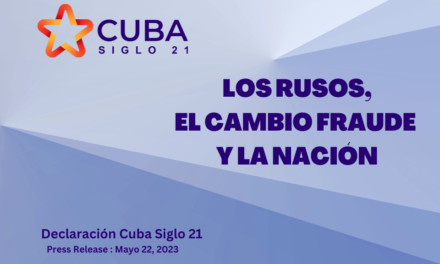Miami (February 13, 2023) The think tank Cuba Siglo 21 believes that Havana should remain on the current list of four countries (Cuba, Iran, Syria and North Korea) that sponsor terrorism for the following reasons:
1- Removing Cuba from the list of countries that support terrorism will immediately strengthen Putin in his aggression against Ukraine.
It is a proven fact that the mafiocracies of Cuba, Iran and Syria, notorious violators of human rights, are also an active part, together with the Kremlin, of the first European war of aggression since 1945. In the case of North Korea, there are unconfirmed rumors that they have supplied some war material to Russia. Syria authorized Putin the logistical military use of its territory, Iran provides it with drones to terrorize the Ukrainian population and Cuba is in charge of reducing pressure on the aggressor from the United Nations and leading the campaign of influence and disinformation in the Spanish-speaking world. The reason why the Kremlin mafia urges the Cuban mafia to get off the list of terrorist countries is because it urgently needs to remove the banking filters to the island, so that its allies in Havana can help it to circumvent the financial sanctions and the Russian oligarchs can launder their money with GAESA, the holding company of the new Cuban oligarchy.
2- Since 1959 Cuba has not only harbored common “fugitives”, such as Robert Vesco, but also militants of organized terrorism.
Joanne Chesimard (Assata Shakur) was not a common assassin acting on her own, but a member of the organized terrorist group Black Liberation Army when she killed a patrolman. The members of the Colombian National Liberation Army who planned from Havana in 2018 and 2019 the bloodiest terrorist attack in a decade in that South American country, live peacefully in Cuba with Chesimard. Explosives manufacturer William Morales, associated with the Puerto Rican Armed Forces of National Liberation (FALN) and members of the Puerto Rican terrorist movement Macheteros, author of attacks and robberies to U.S. banks whose money ended up being deposited in Fidel Castro’s drawers.
It is striking that the now democratically elected president, Gustavo Petro, demands that Cuba be removed from the list of terrorist countries because he wants to engage in “peace negotiations” with the ELN. He who also advocates decriminalizing drugs because, in his opinion, they kill fewer people than climate change, should know better about these things. Gustavo Petro belonged to the narco-terrorist group M-19 that arranged with Fidel Castro and Pablo Escobar the assault on the Palace of Justice in Bogota where they assassinated half of the members of the Supreme Court and burned the files of extraditable drug traffickers. Those were the real criminal, not political, objectives of that action. Escobar’s support in money and weapons — which translated into numerous crimes and protected the drug trafficking activities of that guerrilla organization — was a constant for the M-19. It is logical that its victims differ democratically from the current president’s opinion regarding Cuba’s place on the list.
However, the claim of President Petro, expressed in a dramatic tone before Secretary of State Antony Blinken, has already become the banner and argument of every agent of influence managed by Havana or Moscow in Washington to remove Cuba from the list.
3- In the new geopolitics of the 21st century, Cuba continues to foster terrorism and destabilization in a more active and effective way. Havana – in alliance with Russia and Iran – now serves as coordinator of the mafiocracies of Venezuela, Nicaragua and Bolivia, together with regional organized crime, in the application of a hybrid strategy of subversion.
After the fall of communism in Europe, many analysts began to suffer from a kind of tunnel vision, a “geopolitical glaucoma”. With the disappearance of communist containment as the organizing idea of foreign policy security strategy, there was a tendency to disconnect the links between different actors, scenarios and governments. Country specialists in foreign ministries took precedence over geopolitical theorists who were seen as reminiscent of a world already outdated. Meanwhile, the enemies of democracy transformed themselves into mafiocracies and renewed their instruments of aggression. In Latin America and under the guidance of Cuba, they moved from armed guerrilla struggle to the doctrine of total hybrid warfare to overthrow governments and subvert liberal constitutional systems. The new subversive doctrine combines political struggle within democratic institutions through the infiltration and manipulation of social struggles and the actions of “dormant” networks. These are already clandestinely pre-positioned in the different countries, trained and specialized in provoking political violence and unleashing economic chaos. They are the international armies (they move from one country to another and mimic local protests) of the so-called “Bolivarian breezes” that have hit several countries since they were unleashed after the visit to Cuba of the Secretary of the Security Council of the Russian Federation Nikolai Patrushev. Never since the fall of the USSR in 1991 has there been such a high-ranking visit in that field.
Cuba continues to provide the regional terrorist movement with doctrine, training (now mainly carried out in Venezuelan territory), coordination of actions and intelligence. In the new scheme of regional terrorism Made in Cuba, organized crime replaced the USSR as financier.
Let us overcome the “geopolitical glaucoma”. Cuba must remain on the list of countries that support terrorism. If the 11J prisoners were to be banished en masse, as the Nicaraguan dictator has done, that action should not be reciprocated with a concession that strengthens the oppressors on the island and the aggressors in the Kremlin.







